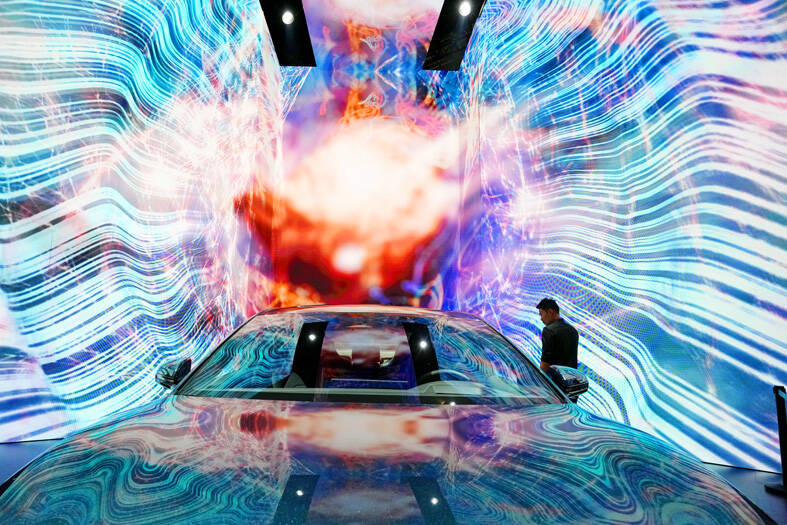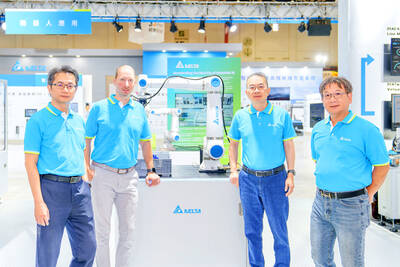China’s push to become self-reliant in the technology sphere is driving more European companies operating there to rethink their research and development (R&D) plans, a report published yesterday by the EU Chamber of Commerce in China.
European firms are growing hesitant about investing in R&D in the world’s second-largest economy as the local firms they would partner with — either state or privately owned — increasingly purchase and use products that are either wholly made in China or are completely devoid of US-linked components, chamber president Joerg Wuttke said.
“It’s something that makes companies hesitate about investing in R&D in China,” he said. “If you don’t know whether your goods will be on, say, procurement lists in one or two years from now, then the chances of investing in R&D will be close to zero.”

Photo: AP
The EU chamber’s report comes as Beijing ramps up a tech autonomy campaign aimed at creating domestic supply chains that are insulated from external shocks. Chinese President Xi Jinping (習近平) has criticized Washington for what he has called a strategy of “containment and suppression” — led by trade restrictions, blacklists and investment curbs — that has challenged China’s technological development.
European companies such as Volkswagen AG and SAP SE are among the biggest foreign enterprises in China, despite the nation’s increasing isolation. However, many are facing growing competition from local champions like Huawei Technologies Co (華為) — one of the most prominent firms Washington has blacklisted. These local firms are developing their own in-house alternatives to foreign software and circuitry.
Others, such as state-backed Inspur Ltd (浪潮集團), are driving research and expansion into areas such as servers and cloud computing, betting on Beijing’s support and that Chinese clients would prefer using domestic substitutes.
In a survey taken by the EU chamber, 52 percent of respondents said sentiment in the EU toward collaboration with China has negatively influenced their company’s R&D activities or strategy in the country. About 26 percent said similar sentiment in the US had a negative effect.
The survey — which polled 107 European firms late last year — still overwhelmingly listed China’s “zero COVID” strategy as having the greatest negative impact. Some 88 percent of respondents to the question about trends influencing R&D chose COVID-19 curbs as having either a highly or somewhat negative effect.
In follow-up interviews with European firms conducted in January and February this year, several companies focused on concerns about supply chain restrictions.
One interviewee from the information and communication technology industry said they had been told by a state-owned enterprise customer that they must localize technology and R&D in China if they were to continue to qualify as a “Made in China” supplier.
Another respondent from the manufacturing sector said private firms are becoming more worried about future political pressure to select suppliers whose entire value chains are based in the country.
The fight between the US and China over technology is not the only geopolitical concern for European companies with Chinese business interests.
About 45 percent of respondents to the question about influential trends for R&D decisions cited Russia’s invasion of Ukraine as having a negative impact on their activities or strategy.
“A potential escalation of Russia’s war in Ukraine or further frictions in the Taiwan Strait are scenarios that businesses are taking into account,” the authors of the EU chamber survey wrote in the report.
They added that the potential risks posed by those tensions “do not support a case for increasing R&D investments in China.”

SETBACK: Apple’s India iPhone push has been disrupted after Foxconn recalled hundreds of Chinese engineers, amid Beijing’s attempts to curb tech transfers Apple Inc assembly partner Hon Hai Precision Industry Co (鴻海精密), also known internationally as Foxconn Technology Group (富士康科技集團), has recalled about 300 Chinese engineers from a factory in India, the latest setback for the iPhone maker’s push to rapidly expand in the country. The extraction of Chinese workers from the factory of Yuzhan Technology (India) Private Ltd, a Hon Hai component unit, in southern Tamil Nadu state, is the second such move in a few months. The company has started flying in Taiwanese engineers to replace staff leaving, people familiar with the matter said, asking not to be named, as the

The prices of gasoline and diesel at domestic fuel stations are to rise NT$0.1 and NT$0.4 per liter this week respectively, after international crude oil prices rose last week, CPC Corp, Taiwan (台灣中油) and Formosa Petrochemical Corp (台塑石化) announced yesterday. Effective today, gasoline prices at CPC and Formosa stations are to rise to NT$27.3, NT$28.8 and NT$30.8 per liter for 92, 95 and 98-octane unleaded gasoline respectively, the companies said in separate statements. The price of premium diesel is to rise to NT$26.2 per liter at CPC stations and NT$26 at Formosa pumps, they said. The announcements came after international crude oil prices

STABLE DEMAND: Delta supplies US clients in the aerospace, defense and machinery segments, and expects second-half sales to be similar to the first half Delta Electronics Inc (台達電) expects its US automation business to remain steady in the second half, with no signs of weakening client demand. With demand from US clients remaining solid, its performance in the second half is expected to be similar to that of the first half, Andy Liu (劉佳容), general manager of the company’s industrial automation business group, said on the sidelines of the Taiwan Automation Intelligence and Robot Show in Taipei on Wednesday. The company earlier reported that revenue from its automation business grew 7 percent year-on-year to NT$27.22 billion (US$889.98 million) in the first half, accounting for 11 percent

A German company is putting used electric vehicle batteries to new use by stacking them into fridge-size units that homes and businesses can use to store their excess solar and wind energy. This week, the company Voltfang — which means “catching volts” — opened its first industrial site in Aachen, Germany, near the Belgian and Dutch borders. With about 100 staff, Voltfang says it is the biggest facility of its kind in Europe in the budding sector of refurbishing lithium-ion batteries. Its CEO David Oudsandji hopes it would help Europe’s biggest economy ween itself off fossil fuels and increasingly rely on climate-friendly renewables. While